Exams & Certification Now Available
Now available: Well-crafted exams for recognizing your knowledge acquisition. Earn a badge of recognition for passing each exam, and a certification logo after passing all exams.
- You may take any of exam, in any order, at any time.
- Every single question of every exam comes from verifiable, transparent, multi-lineage source material of high quality. The exams are designed to support and recognize yoga teachers who meet the Teaching Knowledge Standards.
- You have 3 chances to pass every exam (which is plenty because you’ll receive detailed support for correcting wrong answers).
- Badges are earned for passing exams in each category: Humanities, Anatomy, Safety, Teaching Arts and Yoga Techniques.
- Certification status and logo is provided for passing all exams.
Certification Process
The Teacher Certification process provides a structured educational path and recognition for your commitment and advancement.
Preparatory Study Resources are available multiple ways. Choose from the following:
- Authorized Trainers — If you’ve studied with a Yoga Teacher Central Authorized Trainer, your manual will provide the necessary study material
- Self-Assessment Hub — Free and efficient way to get a sense for your strengths and weaknesses
- Study Program ($25)— Structured approach to study
- Yoga Teacher Central Membership — Unlimited access to all lessons for study (plus extensive class planning support ($25 per month for 2 months or $19 per month for 12 months)
The Study Program provides a methodical approach for filling holes in your education, and fully prepares you to meet the Teaching Knowledge Standards. It’s ethically advisable to meet a minimum standard of knowledge and to integrate that learning before teaching others. The Study Program offers a framework that can guide you in efficiently completing your education in the foundations.
Badges, Sample Exam & Details

For a free sample exam, details on each exam and the badges, plus links to each exam, please go here.
The Study Program
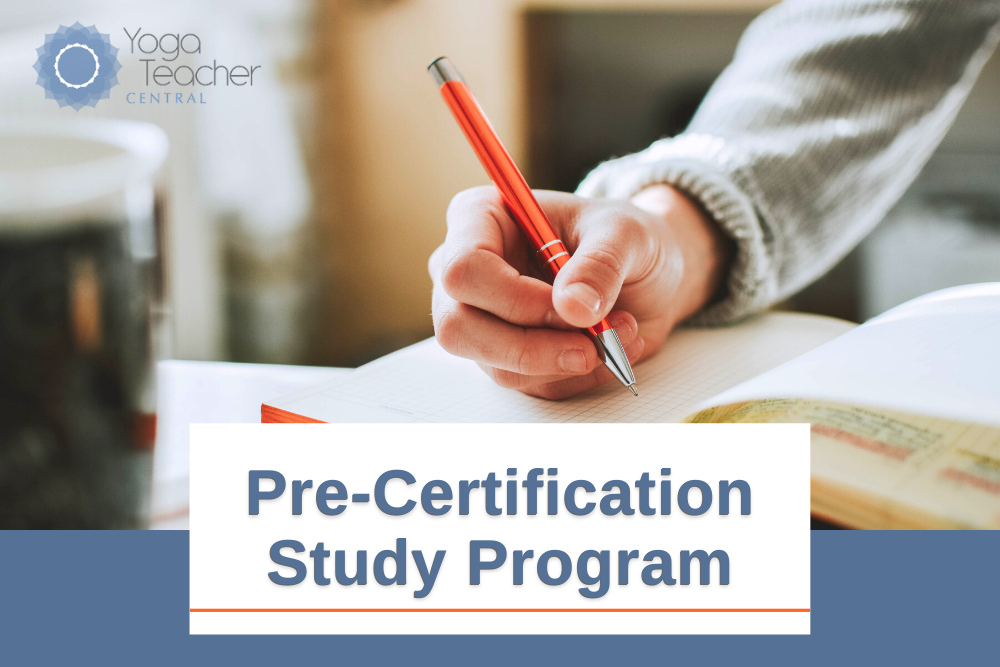
The Study Program is open to members and non-members. Members receive current membership benefits plus these additional ones.
For a one-time fee of $25, you get:
- A downloadable 150-page Knowledge Standards Lesson Guide that you can consult for years to come.
- Five Downloadable Lessons of your choice for lifetime use.
- If you’re not currently a member, you receive 10 days of online access to Yoga Teacher Central for downloading your lessons. If you are a current teacher or trainer member, you have until your expiration to download the lessons.
- Recognition as a YTC Teacher (for life; no expiration), including a marketing kit for displaying your status.
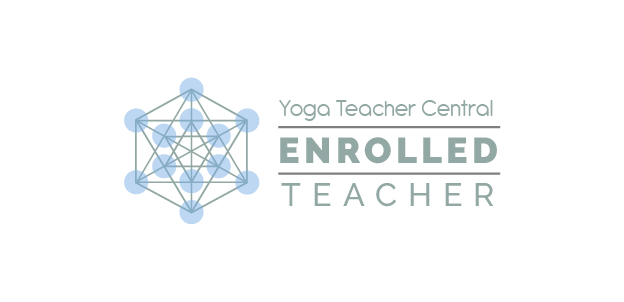
More details:
- The Study Program includes the 150-page Knowledge Standards Lesson Guide — a comprehensive and structured view of the foundational knowledge that yoga teachers need. The guide also includes practical considerations and study tips for advancing your teaching knowledge and capability.
- The guide features a “mind map” for improving knowledge retention and is something you can consult for years to come.
- There is an overview of each of the (roughly 120) teaching standards. You get a clear understanding of the significance of each knowledge standard and become aware of gaps in your education in order to prioritize your learning objectives.
- With your personal learning objectives in mind, you can take immediate action to fill those priority knowledge gaps: you have 10 days of online access to review as many online lessons as you wish, plus download five lessons you can keep for life.
The Knowledge Standards Guide provides you a valuable structured mind-map. This is followed by a page devoted to each of the Minimum Knowledge Standards. For each standard, you’ll see a self-assessment to help you get a quick sense for your familiarity with the subject.
For example, if you are looking at Core Anatomy, you’ll see knowledge standards related to these topics: 1) Core Form & Function 2) Core Fundamental Teachings and 3) TA & Engaging Deeper Abs.
Let’s say you are curious about the scope of this standard so you take a look:
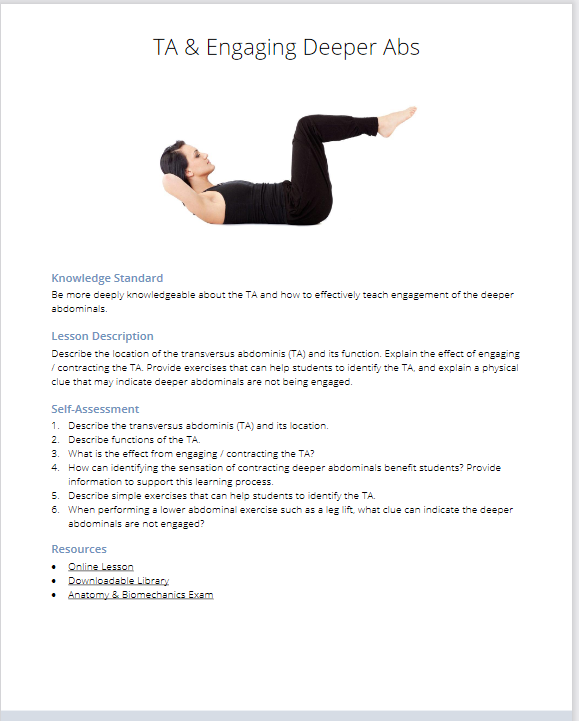
Perhaps you think, “No problem, I’m fully educated on this subject.” Then there’s no need to review this lesson.
But perhaps you then look at Spine and Back Anatomy & Posture standards and see that it includes these topics: 1) Spinal Regions & Vertebrae 2) Back Muscles 3) Spinal Functions 4) Spinal Movements 5) Healthy Posture 6) Postural Issues & Conditions and 7) Spine & Back Teaching Considerations.
If you’re curious about what is encompassed in Healthy Posture, you’ll find this:
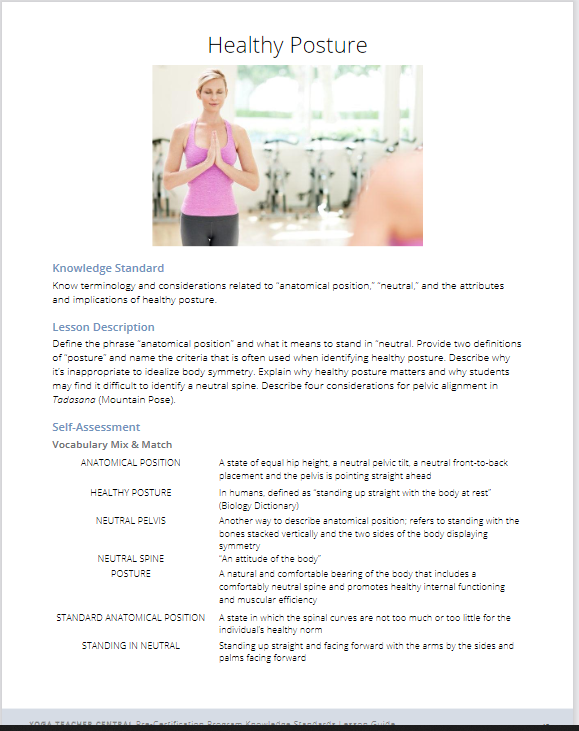
Free Downloadable Samples
Perhaps you then choose to download the lesson. You have two choices of how you wish to get the lesson:
- Lesson —This PDF will be, on average, 5 to 10 pages. Lessons are professionally-derived teachings that are edited and organized to support maximum comprehension and retention. For some lessons, the images will support learning. Lessons include references to sources and resources in case you’d like to consult them directly. Download a free sample here: link
- Assessment (Q&A) — This PDF is a brief summary of the lesson in the form of a Q&A. It does not include images or supporting information and rarely includes sources. If you’ve already studied the lesson online or are otherwise familiar with the lesson but haven’t yet fully integrated it, the Q&A can serve as a great study review or reference. Download a free sample here: link
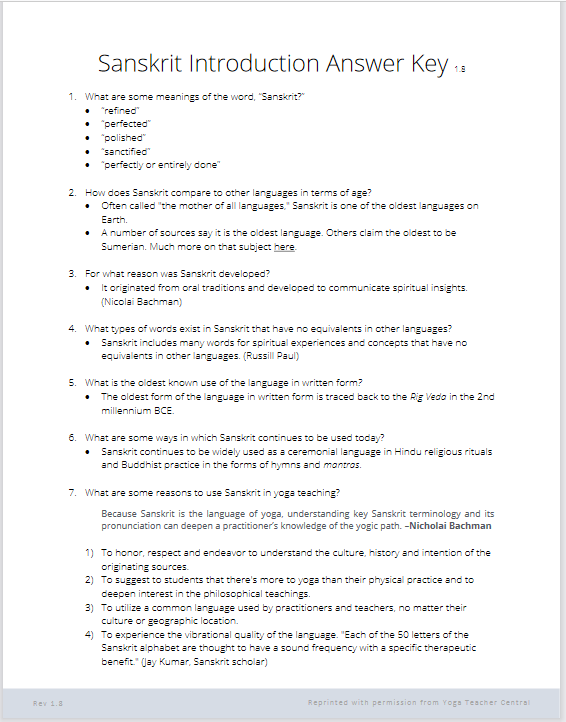
Please let us know if you need anything else.
Backstory: Seeing the Forest and the Trees

Where are we, and how did we get here? What do yoga teachers and trainers really need?
You know that saying, “Can’t see the forest for the trees?” It refers to being so preoccupied with details that we can’t see the situation as a whole.
After more than a decade of supporting yoga teachers, we here at Yoga Teacher Central have spent massive amounts of time deep-diving into the endlessly fascinating trees (of yoga teaching knowledge).
And we’ve also had the opportunity to zoom out and view the vast and complex forest (bigger picture trends, patterns, issues, and opportunities related to the yoga teaching field).
This experience has often brought to mind the story (in yet another tree metaphor) of the woodcutter who is exhausted from sawing away at a tree but when it’s suggested that he pause to sharpen his saw, replies, “I can’t stop to sharpen the saw. Can’t you see? I’m too busy!”
- As in any profession, teachers can easily get caught up sawing away (teaching whenever and wherever they have the opportunity, and from the same knowledgebase they’ve long drawn from) with a dull blade (no access to a consistently deep well of wisdom they can turn to for efficiently guiding their personal evolution).
- And there are many dedicated teachers who recognize a need to sharpen their saw (develop knowledge and skill in an efficient way that leads to greater and greater wisdom)… but who find they are constantly piecemealing their education, not having a guide to help them see where they are on their path, where they’re going, and how to move forward most efficiently and effectively.
As with teachers, there has been a parallel trend among trainers:
- Some trainers were sawing away (churning out “teachers” who were unprepared to teach) and yet not stopping to sharpen their saw (improve the training model and the materials they were using).
- And some trainers poured unfathomable amounts of time and energy into their trainings, having to create models and materials from scratch.
Trainees are better served when trainers can draw from a resource pool rather than having to re-invent everything, giving them the maximum amount of time and energy for the personal and individualized aspects of training: transmission, mentoring, and customizing teachings to meet specific needs.
Problems & Opportunities in a Nutshell
From the “forest level,” we see fundamental problems / opportunities that we can name and solve:
- There is a very profound opportunity in our world for yoga teachers to be ever-more knowledgeable guides in their communities.
- Yoga teachers have gaps in their education, and they lack a structured path for growth.
- Most teacher trainers can better serve trainees as mentors and support them in real-world application when they can spend less time on re-inventing and transmitting foundational knowledge.
Solutions in a Nutshell
In response to these opportunities, we offer an accessible and structured learning pathway for teachers, and structured curriculums and lessons for trainers. With our support:
- Teachers are empowered to take charge of their learning and growth, reaching very high levels of practical knowledge, enabling them to reach their potential as effective mentors and teachers.
- Teachers receive solid support for efficiently building their teaching knowledgebase, freeing them up to have more time to themselves, more time to individualize teachings, and more time to study any number of complementary areas such as psychotherapy, nutrition, Ayurveda, childbirth, healthy aging or other areas of expertise.
- Trainers are freed up from the gargantuan administrative tasks related to compiling and transmitting foundational knowledge, leaving them more energy to customize and optimally support individual teachers.
- Trainers and teachers efficiently develop deeper and more advanced understandings that make for a more efficient and effective application during practice, teaching and mentorship.
Disconnected Teachings vs. Integration & Application
The evolution of a teacher does not come from learning bits of disconnected teachings. It comes from integration and application.
To wisely apply what is learned requires an understanding of foundations and of context. A piece of knowledge is only valuable to you as a teacher if you have:
- A solid foundation and mind-map, enabling you to know how new information “fits.”
- A way to answer these questions: What foundational and related knowledge is required to properly understand and apply this teaching? When is this teaching called for… under what circumstances, and with which students?
True & Practical Evolution
Some will tell you that such depth of knowledge comes from “time and experience” implying 1) that it can’t be taught and 2) that experience magically turns into wisdom. But this is demonstrably incorrect.
First, knowledge and application are two different things. Knowledge can be taught. Application improves with experience.
Simply applying what you already know and acquiring new knowledge however it happens to come along the way is very inefficient. Knowledge can be acquired in a methodical way to support application.
And even when it comes to “time and experience” there are caveats. Time and experience are powerful contributors to advancement in skill and wisdom. However, this is greatly dependent on if one is engaged in “deliberate practice” (which specifically builds on strengths and improves weaknesses) or “naive practice” (a form of repetition).
- Expertise does not come from relying on “essentially just doing something repeatedly, and expecting that the repetition alone will improve one’s performance.” (See more on Anders Ericsson’s research on expertise here.)
- In other words, just “getting out there and teaching” is not enough to grow. Rather, your teaching will exponentially improve when you follow a strategic path.
When it comes to knowledge, no matter how many teaching tips, Sanskrit words, anatomy terms and interesting tidbits are learned, a teacher isn’t going to meet their potential without understanding not only how the knowledge relates to the whole, but how it can optimally be applied. There are many things that can be learned which will expedite and maximize improvements in teaching. This is in contrast to presuming “time and experience” will naturally result in evolution and meeting potential.
- The Knowledge Standards Guide is crystal clear on the foundational knowledge required for advancing knowledge.
- The foundational lessons “begin at the beginning” so that your foundation is rock solid. And they provide very real and practical considerations related to application.
Knowledge vs. Practice
The YTC program addresses the knowledge component of teaching, but this does not discount the vital importance of practice and mentorship. In fact, there are reasons to believe that when we address knowledge gaps, we naturally help to improve other aspects of teaching and training. For example, an accessible and structured learning pathway can:
- Empower teachers to take charge of their learning and growth.
- Comfort teachers that they are receiving solid support for efficiently building their teaching knowledgebase while also being immersed in any number of complementary areas such as psychotherapy, nutrition, Ayurveda, childbirth, healthy aging or other areas of expertise.
- Free up trainers from some of the tasks related to simply transmitting foundational knowledge, leaving them more energy to customize and optimally support individual teachers.
- Make mentorship, practice and teaching more effective because it’s conducted with a base level of knowledge that leads to better integration and advances understanding.
Here are some additional considerations:
- This program offers a solution that can be implemented individually as desired (eventually resulting in a collective upleveling) as opposed to any sort of authoritarian, regulatory gobbledygook.
- The study program was created with built-in flexibility for each teacher to address his or her own needs as opposed to having to undertake something that wastes your time covering things you already know or don’t need.
- When you can meet the Minimum Knowledge Standards, you’ll have such strong fundamentals in place that you can take maximum advantage of growth opportunities such as studying with elite teachers, moving toward yoga therapy study, or specializing in particular areas of teaching interest.
- With such a solid foundation, you’ll have strong confidence in your ability to put pieces together to meet particular teaching needs. You’ll see how the comprehensive knowledgebase works like building blocks to help you in real-life teaching to apply strategies effectively.
More
There are some less obvious aspects about addressing these opportunities that we really like:
- We like how these opportunities can be addressed individually as desired (eventually resulting in a collective upleveling) as opposed to any sort of top-down, regulatory approach that typically always distills down into bureacracy replacing true problem-solving.
- We like how the Study Program has built-in flexibility for each teacher to address his or her own needs as opposed to having to undertake something that wastes their time covering things they already know or don’t need.
- We like knowing that teachers who have learned the Minimum Knowledge Standards have such strong fundamentals in place that they can take maximum advantage of growth opportunities such as studying with elite teachers, moving toward yoga therapy study, or specializing in particular areas of teaching interest.
- We like that with such a solid foundation, teachers will have strong confidence in their ability to put pieces together to meet particular teaching needs. In fact, they’ll more efficiently realize how the comprehensive knowledgebase works like building blocks in a way that can help them in real-life teaching to apply strategies effectively.
The reason we care so much about supporting teachers and trainers is because we believe yoga teachers are absolutely vital to the healing of our planet. We honor your work so very much.








